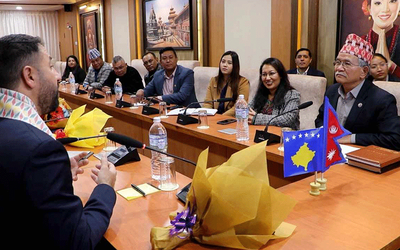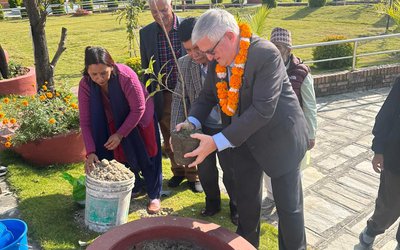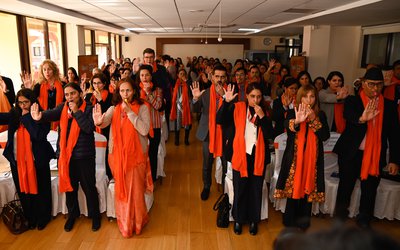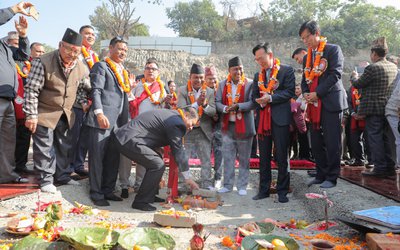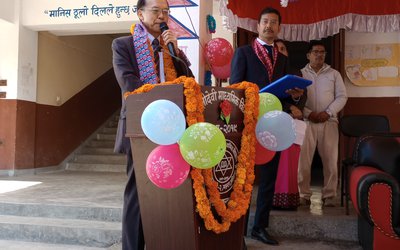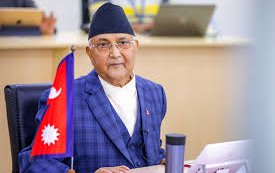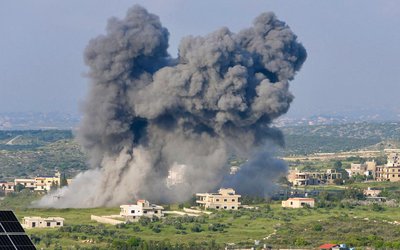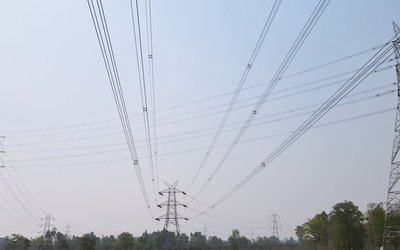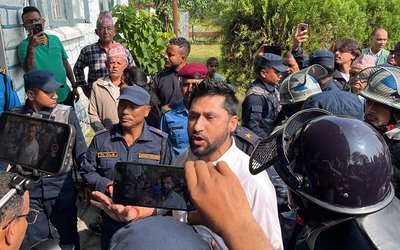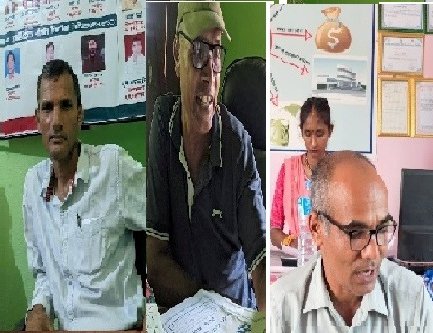
Dukharan Yadav, head of Aparbasi Multipurpose Cooperative in Laxminiya, Dhanusha district; Bashanta Kumar Yonjan, chairperson and Managing Director of Kanti Bazar Krishi Shahakari Sanstha in Gaushala Municipality Ward 12, Mahottari, Madhesh Province; and Bashudev Khadka, coordinator of the Financial Committee of Chahana Saving and Credit Cooperatives in Itahari Sub-Metropolitan City-1, Sunsari district, Koshi Province, share common traits.
They are all returnee migrants leading cooperatives of various types in the Madhesh and Koshi Provinces. Additionally, they are all alumni of the FEEK programs under the RERP Samriddhi Project.
Although these three cooperatives operate in different areas of lending and modes of operation, they all prioritize migrant savings and lending to poor and marginalized women, spouses of foreign migrants, and returnee migrants to start various ventures, both on-farm and off-farm.
As most cooperatives across Nepal face a liquidity crunch, with high volumes of cash withdrawals and an increasing number of defaulters, the management of these three cooperatives has found the knowledge and skills gained through FEEK to be a safeguard for maintaining financial stability in the current chaotic situation.
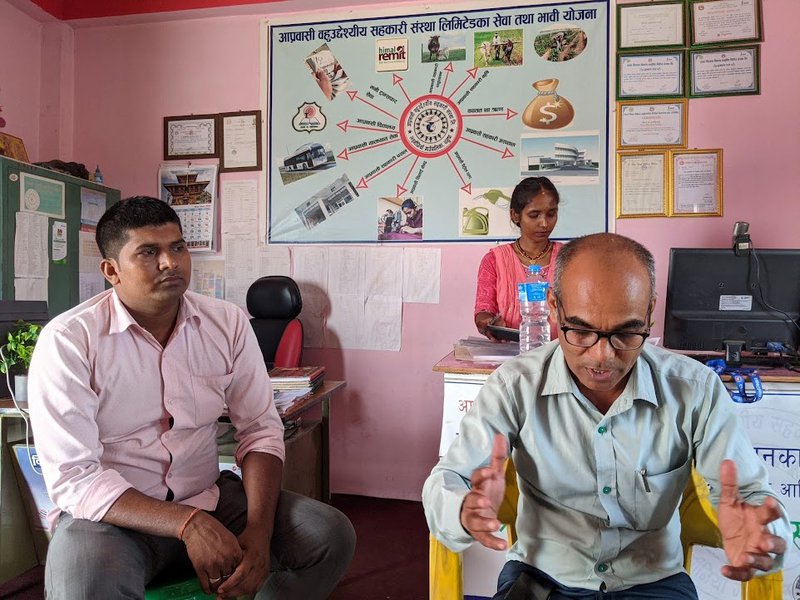
With paid-up capital of Rs. 10.9 million, Chahana Saving and Credit Cooperative operates in Wards 19, 20, and 1 of Itahari Sub-Metropolitan City. Starting with 35 members and a deposit of Rs. 100,000 ($800) in 2017, Chahana Saving and Credit Cooperative now boasts deposits of Rs. 120 million with over 600 members. It lends money to poor women, migrants, migrant families, and other community members.
“Before connecting with the SAMRIDDHI Project, we lacked basic knowledge regarding saving schemes, lending mechanisms, collateral, interest, and group savings,” said Khadka. “Migrant workers have been sending remittances through our cooperative. However, we had never introduced mandatory saving schemes for members. Following FEEK training, we now have a mandatory monthly saving scheme where each member has to deposit Rs. 300 ($2.5). The cooperative now collects around Rs. 20,000 ($150) a month and Rs. 240,000 ($1,800) a year,” said Khadka.
After receiving training from FEEK, the cooperatives conducted further training for their group members, emphasizing the importance of savings and loans for enterprises. Situated in the heart of Itahari city, Chahana Saving and Credit Cooperative has provided loans to various enterprises and some livestock ventures.
“In recent months, our members withdrew over Rs. 40 million. However, our new saving schemes and safeguard measures introduced for loan sanctioning prevented a major crisis,” said Khadka.
Yonjan, chairperson of Kanti Bazar Krishi Shahakari Sanstha and a FEEK facilitator supporting remittance-based on-farm enterprises, noted that the FEEK training helped his cooperative increase its membership and capital due to the financial literacy provided by the project.
“I learned skills to develop long-term strategies, launch various attractive schemes, and handle managerial issues, including loan management. After completing FEEK training, our cooperative also launched the Samriddhi Foreign Employment Saving Account and a self-employment scheme. Additionally, we started collecting Rs. 300 per month from each member, increasing our reserves and capital,” said Yonjan.
“The cooperative has been conducting access to finance and financial literacy training at the group level in the area. After initiating training for women, migrant families, and returnee migrants, membership and savings deposits have increased,” said Yonjan. “If we had taken the training earlier, our position would be much better now.”
Two years ago, Yonjan's cooperative had 115 members with just Rs. 100,000 in savings capital. With the FEEK training, he has increased membership to 615 and savings capital to Rs. 1.2 million.
“The cooperative has been conducting access to finance and financial literacy training at the group level under FEEK model in the area. After launching training for women, migrant families, and returnee migrants, membership and savings deposits have increased,” said Yonjan. “If we had taken the training earlier, our position would be much better now.”
“Each of our women members earns around Rs. 300,000 ($2,000) annually from selling vegetables. Each of them has savings of around Rs. 100,000 ($700) in banks and cooperatives. The profit from vegetable farming serves as an incentive for the families of migrant workers to engage in commercial agriculture through the cooperative.”
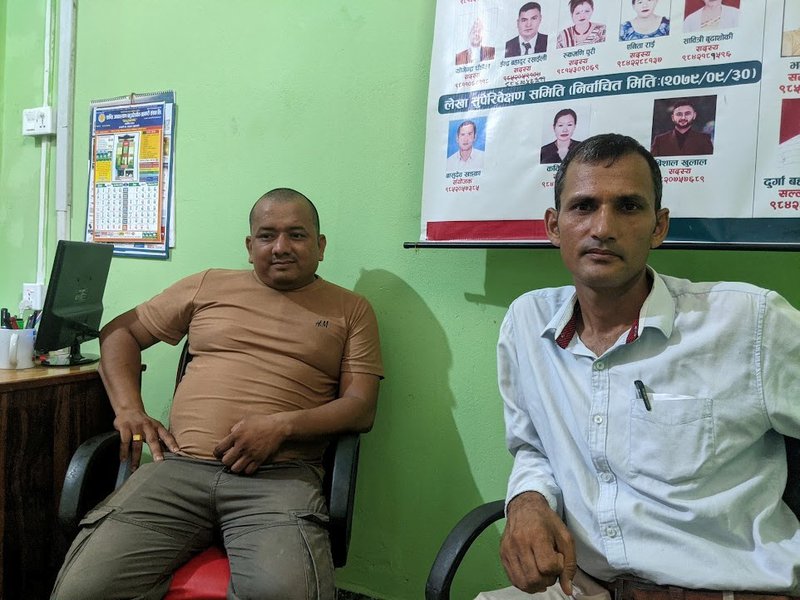
True to its name, Aparbashi Multipurpose Sahakari Sanstha, Yadav’s cooperative focuses its investments on migrant workers and their families overwhelming majority are women, providing both on-farm and off-farm loans. The cooperative also offers remittance services, with 500 of its members being migrant workers and their families.
Although Yadav went to Dubai with a CTVT training certificate in electricity, he started as a salesman at a fancy store. During his stay, he encountered many Nepalese migrant workers facing financial problems and difficulties sending remittances securely. With these experiences, Yadav formed a group to establish a cooperative aimed at supporting migrant workers and their families.
“I don’t know much about financial transactions, but my involvement with the Samriddhi and FEEK training has significantly changed how our cooperative operates. We now have various savings schemes for members and migrant workers,” said Yadav.
Established in 2019, Aprabasi Multipurpose Cooperatives Limited has 649 members, including 586 women and 58 men. With total capital of Rs. 1.64 million, the cooperative has deposits of Rs. 5.7 million and investments of Rs. 5.1 million. It operates 28 active groups and provides loans to 252 of its members at an interest rate of 12 percent.
In addition to vegetable farming (on-farm), the cooperative provides soft loans to women, spouses of migrants, and returnee migrants to open grocery stores, small tea stalls, and cosmetic shops in three wards of Laxminiyapur Rural Municipality. “FEEK training has been a game changer in the management of our cooperative. The number of members doubled with the announcement of various schemes,” said Yadav.
Although Yadav, Yonjan, and Khadka spent close to a decade in the UAE, Qatar, Malaysia, and Saudi Arabia, they gained formal knowledge and professional skills in cooperative operation through training provided by RERP SAMRIDDHI under FEEK.
These three cooperatives successfully target women from poor and marginalized communities, spouses of migrant workers, and returnee migrants to improve their economic conditions.
Although the proportion of such cases is small, the three cooperatives agree that there are ample opportunities for utilizing remittances, ranging from consumption to productive investment and savings.
Since the launch of the RERP Samriddhi Project, 236 cooperatives and 91,616 individuals have received FEEK training across 148 sub-metropolitan areas, municipalities, and rural municipalities in 16 districts of Koshi, Madhesh, and Bagmati Provinces.
“As RERP nears completion, the Nepal government has learned a lot from the project. We are pleased to have successfully implemented it in collaboration with IFAD,” said Krishna Bahadur Raut, Secretary of the Ministry of Industry, Commerce, and Supply. “Proper utilization of remittances through formal channels to improve the livelihoods of poor women and migrant families remains a key issue for the government of Nepal.”
The RERP project, now in its closing phase, has provided valuable insights into rural finance, livelihoods, and migration sectors. The Fiscal Year 2024/025 budget includes programs to encourage self-employment for returnees from foreign employment in agriculture, micro, small, and medium enterprises, and the service sector—areas where RERP has made significant investments.
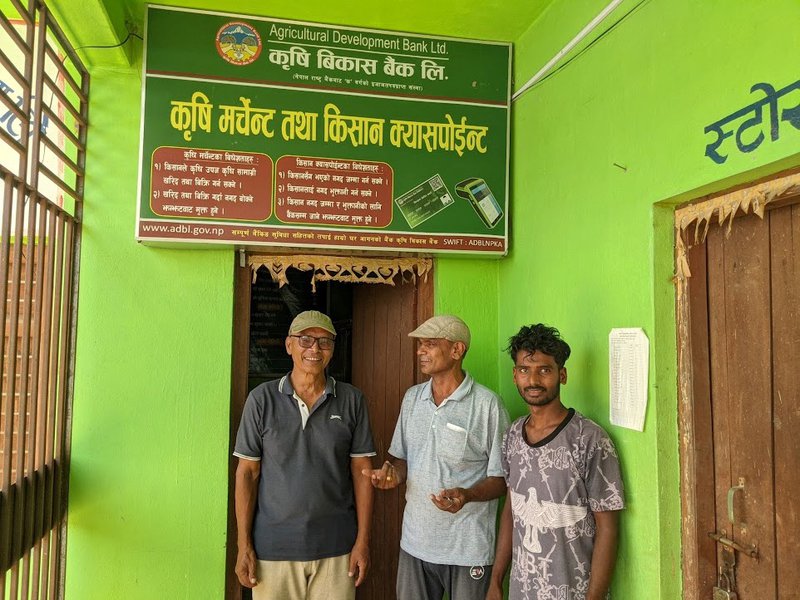
“Remittances can often be the first financial service used by migrants and their families offered by regulated providers. This is an opportunity to financially include them. Furthermore, in many cases, remittance senders or receivers are women. This presents an opportunity to design specific financial products and training that meet women’s needs, furthering financial inclusion and economic empowerment,” said Bibiana Vasquez, Financial Inclusion Senior Specialist at IFAD.
Aimed at reducing poverty through employment-focused and inclusive economic development, the PRSP training provides sustainable sources of income to poor households, migrant families, and returnees by creating micro, small, and rural medium-sized enterprises. This approach develops local businesses and creates jobs, focusing on enhancing the capacity of grassroots financial institutions like cooperatives and their management.
“Rural Finance/Financial Inclusion is one of the major components of our project. We provided training under FEEK to strengthen the capacities of financial institutions through training and technical assistance, improving access to finance for rural communities. The project worked with cooperatives and regulated financial institutions like the Agriculture Development Bank, which either directly lend to the project target population or use cooperatives to channel their resources,” said Saroj Prasad Guragain, Project Manager.
“Despite the major crisis in the cooperative sector, most cooperatives in the project areas are operating smoothly and achieving their targets. FEEK has provided training in business skills and financial literacy to over 91,000 people in the project areas, which is a significant achievement.”
RERP has implemented training through FEEK in partnership with cooperatives, serving large numbers of individuals in its priority local institutions. This training catered to a variety of interests and characteristics, influencing the scope and level of financial education and business skills most useful to them.
With the ongoing liquidity crisis in the country, obtaining loans has become difficult for many small business owners and farmers, hindering their economic activities. However, cooperatives benefiting from the FEEK programs are operating effectively, serving the interests of women and migrant families.
According to the World Bank, remittance flows were estimated at US$11 billion in 2023, accounting for 26.6% of Nepal’s GDP. This is more than the combined inflow of Official Development Assistance (ODA) and Foreign Direct Investment (FDI) to Nepal.

Given such circumstances, proper mobilization of local financial institutions like cooperatives and broadening the financial literacy campaign are key to driving economic transformation among women and migrant families.
“Close collaboration and partnership with local governments are key factors for the success of the project, including the FEEK program,” said Guragain.
In addition to local governments, Helvetas-Nepal plays a crucial role as a key partner in providing training support, while FNCCI actively engages and mobilizes the private sector.\.
Implemented in close collaboration with Palikas (Municipalities and Rural Municipalities), who are in close proximity to workers aspiring to go abroad, returnees, and their families, and have the mandate to register, inspect, and guide cooperatives, RERP has successfully demonstrated how cooperatives, under enhanced leadership and financial literacy, can make a significant difference.
The project has achieved notable impacts in the project areas, with a total project cost of US$ 49.32 million. This includes US$ 19.79 million from IFAD financing, US$ 9.15 million from the Nepal Government, US$ 6.64 million from beneficiaries, and US$ 13.75 million from the local private sector.

Keshab Poudel
Poudel is the editor of New Spotlight Magazine.
- NEPAL-BANGLADESH POWER TRADE : A Significant Achievement
- Nov 21, 2024
- BEEN: Honoring The Contribution
- Oct 22, 2024
- Nepal Commemorates 7 October And Calls For Release Of All Hostages Including Bipin Joshi
- Oct 07, 2024
- JAPANESE ENVOY KIKUTA YUTAKA: Charismatic Diplomat
- Sep 25, 2024
- POLITCS: Do Or Die
- Sep 13, 2024

